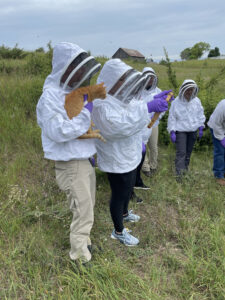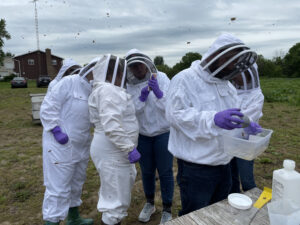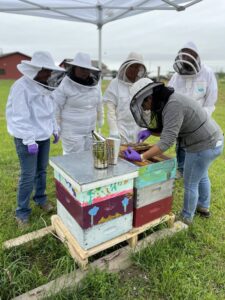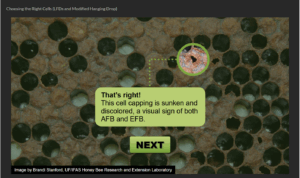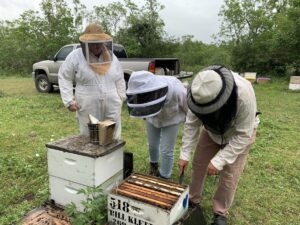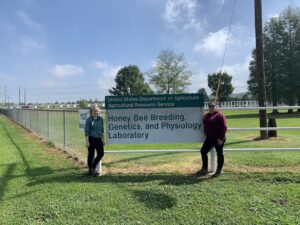Progress report for LNC22-468
Project Information
Our project “Taking the sting out of honey bee medicine: Training and tools for veterinarians to increase access to care for beekeepers” will create several positive outcomes for beekeepers and veterinarians. The main goals of this project are to improve honey bee health and to improve how antibiotics are used in beekeeping. Beekeepers will learn disease identification, alternative treatments and prevention, when antibiotics should and should not be used, and how to minimize risk of resistance and honey contamination. Veterinarians will learn honey bee biology and husbandry, diagnostics of honey bee diseases, and will receive hands-on training on honey bee health inspections.
Honey bee bacterial diseases continue to be a major problem for beekeepers, resulting in significant colony death, loss of honey crop, and destruction of contaminated equipment. In 2017 new federal regulations required that beekeepers work with a veterinarian to obtain antibiotics. Unfortunately, veterinarians lack training for honey bees, and are therefore unwilling or unable to provide this service. In response, beekeepers have been using antibiotics with little to no oversight or guidance, including stockpiling old antibiotics and purchasing antibiotics labeled for other livestock.
Our approach is a multi-tiered educational campaign targeting two key states in the North Central region and two states in the south where our beekeepers overwinter their colonies. First, we will assess the needs, obstacles, and interests of veterinarians. We will work with a cohort of veterinarians each year, providing them with beekeeping diagnostic kits, hands-on training, and ongoing support, so each state will have a few, regionally distributed veterinarians able to work with beekeepers. We will develop two online training courses based on our collective existing materials and new materials created to meet identified needs. One course will target veterinarians and veterinary medicine students and the other will target beekeepers. Finally, we will develop an externship program for veterinary medicine students.
The outcomes of this program will directly support beekeepers– they will have trained experts that they can work with to address disease issues in their hives. This will lead to improved antibiotic use, reducing the risk of honey contamination and resistance. More knowledgable beekeepers and veterinarians will also lead to better colony health, with increased control of bacterial diseases. Healthier bees will improve the sustainability of the honey bee colonies in the North Central region as well as the fruit and vegetable growers that depend on their services for pollination.
Learning outcomes for veterinarians include, hive handling, diagnostics, disease management / treatment recommendations, honey bee biology, how to work with beekeepers, and integrated pest management.
Beekeepers will learn requirements for a valid veterinarian-client-patient relationship (VCPR), how to find trained veterinarians, diagnostics, appropriate antibiotic use, disease prevention, and alternative treatments.
The most important action item for veterinarians is an increased number who are willing to work with beekeepers. Veterinary students and veterinarians will complete our online course and students will complete externships. Beekeepers will establish more VCPRs, and will improve their antibiotic use.
Our project “Taking the sting out of honey bee medicine: Training and tools for veterinarians to increase access to care for beekeepers” addresses a significant and fairly new problem in beekeeping: a lack of trained veterinarians. Recent changes to federal policy require that beekeepers can no longer purchase antibiotics directly, and must work with a licensed veterinarian to acquire medications needed to manage honey bee diseases. Unfortunately, because honey bee medicine has not been taught in veterinary schools, most veterinarians have not felt comfortable working with beekeepers, and beekeepers are not able to access medicine needed to keep their bees in good health.
Our project approached this problem through a few objectives. First, we developed and administered a survey for veterinarians to understand their experience with working with bees and beekeepers, as well as what they felt were obstacles for them to take a beekeeping client. This survey was written and administered in 2023.
The second objective was to provide intensive training to veterinarians. We developed and disseminated a kit that provided them with all the diagnostic tools needed to work with a beekeeper, and provided hands on trainings at local beekeeping operations.
The survey has been filled out by over 1000 veterinary practitioners, and we disseminated over 50 kits to veterinarians who attended our hands-on clinics.
Our third objective is to develop online training resources. Our first resource was developed and released in early 2024 - An online learning module "Diagnostic tools for honey bee diseases".
Cooperators
Research
Education
Veterinary student training was carried out at both University of Minnesota and Michigan State University. In all years of the project, MSU Dr. Milbrath acted as the faculty advisor for the College of Veterinary Medicine Honey Bee Club, and taught the Honey Bee Medicine Rotation (outside the grant). In 2024 and 2025 Dr. Lee worked with the UMN Bee Squad and a faculty member at UMN CVM (Dr. Melinda Wilkins) to start a bee club there as well as a summer rotation.
Project Activities
Educational & Outreach Activities
Participation summary:
We presented about this project in multiple forums. We presented a poster at the world global honey bee conference Apimondia in 2023, and a talk on the project in 2025. We also presented this project to the American Bee Research conference in 2024.
Learning Outcomes
- Honey bee medicine
Project Outcomes
We measured impacts for workshops in Michigan in 2024.
In 2024, Michigan State University instructed 4 in-hive beekeeping workshops. The workshops were held in Brimley, Deckerville, and Lansing. There was a total of 42 participants, including practicing and retired veterinarians, veterinary technicians, and veterinary students. Participants were invited to fill out a pre-survey before the workshop and follow-up survey after the workshop.
Prior to the workshop, 43% (10 of 23) of respondents reported a medium to high level of confidence in working with honey bees. After the workshop, 100% (26 of 26) of respondents reported a medium to high level of confidence in working with honey bees as a result of the workshop.
Prior to the workshop, 43% (10 of 23) of respondents reported a medium to high level of confidence in working with beekeeper clients. After the workshop, 96% (25 of 26) of respondents reported a medium to high level of confidence in working with beekeeper clients as a result of the workshop.
100% (26 of 26) of respondents reported they increased their knowledge of how to perform a basic hive inspection as a result of the workshop.
96% (25 of 26) of respondents reported they knew how to perform a varroa mite check using an alcohol wash as a result of the workshop.
96% (25 of 26) of respondents reported they understood resources available to them as a result of the workshop.
43% (10 of 23) of respondents reported they intended to take on new clients who are beekeepers; an additional 52% (12 of 23) reported they maybe intended to take on new clients who are beekeepers.
Quotes
"Fantastic Learning Experience"
"I really enjoyed this course, it really built on last year which is very interesting. The enthusiasm of Meghan & Ana is wonderful. I need to go check out the online tools available as well. Thank you!!"
"this was a very helpful course & appreciate all the time, effort, and resources that went into this."
"Really informative, hands on experience"
"Helpful to actually ""see"" important things in the hive (like eggs & unhealthy brood)."
"The program, staff and the resources you have put together are amazing - thank you!"
"We cannot stop talking about our honeybee clinic experience! Thank you again."
